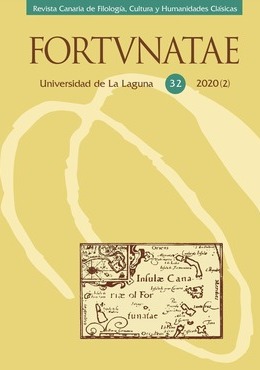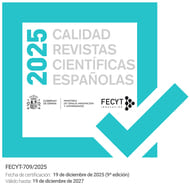En torno al ‘filohelenismo’ de los escolios homéricos
Resumen
Los comentadores antiguos de la Ilíada substituían la dicotomía homérica “aqueos vs. troyanos” por “griegos vs. bárbaros”. Los estudiosos modernos ya no denominan ‘bárbaros’ a los troyanos; pero suelen contraponer troyanos y ‘griegos’, obviando las denominaciones originales de aqueos, dánaos, etc. Esta distorsión no es inocua: da por supuesto, sin discusión, que los auditorios de la Ilíada experimentaban una afinidad especial por un bando y lo identificaban con “los nuestros”. No es imposible que este sentimiento de afinidad existiera a veces; pero resulta abusivo interpretarlo en sentido identitario, étnico o ‘patriótico’. Sin embargo, esto es lo que suelen hacer los escolios, con grave distorsión, en bastantes casos, del texto original.
Citas
BIARDEAU, M. (2002): Le Mahābhārata. Un récit fondateur de brahmanisme et son interprétation (2 vols.), Éditions du Seuil, Paris.
BRELICH, A. (1958): Gli eroi greci. Un problema storico-religioso, Ateneo, Roma.
BURKERT, W. (1966): «Kekropidensage und Arrhephoria. Vom Initiationsritus zum Panathenäenfest», Hermes XCIV: 1-25.
BURKERT, W. (2001): Kleine Schriften I. Homerica, ed. Ch. RIEDWEG, Vandenhoeck und Rupprecht, Göttingen.
CALAME, C. (1987): «Spartan Genealogies: The Mythological Representation of a Spatial Organisation», en J. BREMMER (ed.), Interpretations of Greek Mythology, Croom Helm, London & Sidney, pp. 153-186.
CALAME, C. (1996): «Feste, ritieforme poetiche»,en S. SETTIS (ed.), I Greci. 2. Una Storia greca. I. Formazione (fino al VI secolo a. C.), Einaudi, Torino, pp. 470-496.
CLAY, J. S. (1989): The Politics of Olympus. Form and Meaning in the Major Homeric Hymns, Princeton University Press, Princeton NJ.
DAVISON, J. A. (1958): «Notes on the Panathenaea», JHS LXXVIII: 23-42.
DETIENNE, M. (2003): Comment être autochtone, Seuil, Paris.
DICKEY, E. (2007): Ancient Greek Scholarship, American Philological Association / Oxford University Press.
DUMÉZIL G. (1995): Mythe et Épopée I. II. III, Gallimard, Paris.
EDWARDS, M. W. (1991): The Iliad: A Commentary. Volume V: Books 17-20, Cambridge University Press.
FAULKNER, A. (2008): The Homeric Hymn to Aphrodite. Introduction, Text, and Commentary, Oxford University Press.
GRAZIOSI, B. (2002): Inventing Homer. The Early Reception of Epic, Cambridge University Press.
HALL, E. (1989): Inventing the Barbarian. Greek Self-Definition throughTragedy, Clarendon Press, Oxford.
HALL, J. M. (1997): Ethnic Identity in Greek Antiquity, Cambridge University Press.
HALL, J. M. (2002). Hellenicity. Between Ethnicity and Culture, The University of Chicago Press, Chicago - London.
HASLAM, M. (1997): «Homeric Papyri and the Transmission of the Text», en I. MORRIS & B. POWELL (eds.), A New Companion to Homer, Brill, Leiden - New York, pp. 55-100.
ERBSE, H.(1969-1988): Scholia graeca in HomeriIliadem. Scholia vetera.(7 vols.),Walter de Gruyter, Berlin.
JENSEN, M. S. (1980): The Homeric Question and the Oral-FormulaicTheory, MuseumTusculanum Press, Copenhagen.
KAKRIDIS, J. T. (1971): Homer Revisited, Gleerup, Lund.
KIRK, G. S. (1985): The Iliad: A Commentary. Volume I: Books 1-4, Cambridge University Press. LORAUX, N. (19902): Les enfants d’Athéna. Idées athéniennes sur la citoyenneté et la division des sexes, La Découverte/Seuil, Paris.
MACKIE, H. (1996): Talking Trojan. Speech and Community in the Iliad, Rowman & Littlefield, Lanham - Boulder - New York - London.
NAGY, G. (2002): Plato’s Rhapsody and Homer’s Music. The Poetics of the Panathenaic Festival in Classical Athens, Center for Hellenic Studies / Harvard University Press, Washington - Athens.
NAGY, G. (2004): Homer’s Text and Language, University of Illinois Press, Urbana - Chicago.
NAGY, G. (2010): Homer the Preclassic, University of California Press, Berkeley - Los Angeles - London.
NAGY, G. (2013): The Ancient Greek Hero in 24 Hours, The Belknap Press - Harvard University Press, Cambridge (MA) - London.
NEILS, J. (1992): Goddess and Polis.The Panathenaic Festival in Ancient Athens, Princeton University Press, Princeton NJ.
NENCI, G. (1994): ERODOTO. Le Storie. Libro V. La rivolta della Ionia. Fondazione Lorenzo Valla, Arnoldo Mondadori, Verona.
PÒRTULAS, J. (2008): Introducció a la Ilíada. Homer entre la història i la llegenda, Fundació Bernat Metge, Barcelona.
PINSENT, J. (1984): «The Trojans in the Iliad», en L. FOXHALL - J. K. DAVIES (eds.), The Trojan War. Its Historicity and Context, Bristol Classical Press, Bristol, pp. 141-162.
REINHARDT, K. (1956): «Zum homerischen Aphroditehymnus», en Festschrift für Bruno Snell zum 60. Geburtstag, von Freunden und Schülern überreicht, Beck, München, pp. 1-14.
REINHARDT, K. (1961): Die Ilias und ihr Dichter. Herausgegeben VON U. HÖLSCHER, Vandenhoeck und Rupprecht, Göttingen.
RICHARDSON, N. J. (1980): «Literary Criticism in the Exegetical Scholia to theIliad: A Sketch», CQ XXX: 265-287.
SABBATUCCI, D. (1978): Il mito, il rito e la storia, Bulzoni Editore, Roma.
SEAFORD, R. (1994): Reciprocity and Ritual. Homer and Tragedy in the Developing City-State, Clarendon Press, Oxford.
SCHIRONI, F. (2018): The Best of the Grammarians. Aristarchus of Samothrace on the Iliad, University of Michigan Press, Ann Arbor.
SMITH, P. M. (1981): «Aineiadai as Patrons of Iliad XX and the Homeric Hymn to Aphrodite», HSCP LXXXV: 17-58.
SVENBRO, J. (1984): La parola e il marmo. Alle origini della poetica greca, Boringhieri, Torino.
TAPLIN, O. (1990): «Agamemnon’s Role in the Iliad», en C. PELLING (ed.), Characterization and Individuality in Greek Literature, Clarendon Press, Oxford, pp. 60-82.
VIAN, F. (1963): Les origines de Thèbes. Cadmos et les Spartes, Klincksieck, Paris.
VAN DER VALK, M. (1953): «Homer’s Nationalistic Attitude», AC XXII: 5-26.
VAN DER VALK, M. (1985): «Homer’s Nationalism, again», Mnemosyne XXXVIII: 373-376.
WEST, M. L. (2011): The Making of the Iliad. Disquisition and Analitical Commentary, Oxford University Press.
WEST, S. R.(1988): «TheTransmission of theText», en A. HEUBECK, S.R.WEST & J. B. HAINSWORTH, A Commentary on Homer’s Odyssey. Volume I. Introduction and Books I-VIII, Clarendon Press, Oxford, pp. 33-48.
Los autores conservan los derechos de autor y garantizan a la revista el derecho de ser la primera publicación del trabajo al igual que licenciarlo bajo una Creative Commons Attribution License que permite a otros compartir el trabajo con un reconocimiento de la autoría del trabajo y la publicación inicial en esta revista.
Los autores pueden establecer por separado acuerdos adicionales para la distribución no exclusiva de la versión de la obra publicada en la revista (por ejemplo, situarlo en un repositorio institucional o publicarlo en un libro), con un reconocimiento de su publicación inicial en esta revista.






